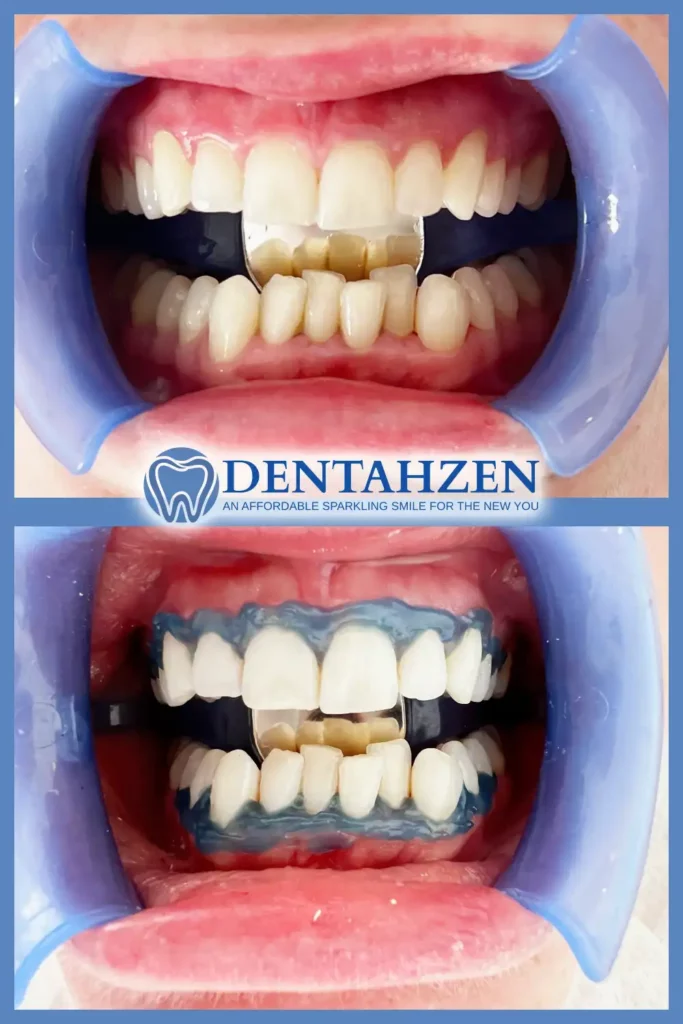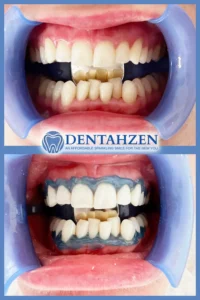Teeth whitening risks: What precautions to take before teeth whitening
What are the precautions to take before teeth whitening? Teeth whitening is a popular cosmetic procedure that can transform your smile, boosting your confidence and self-esteem. However, it is important to be aware of the potential risks before embarking on this journey. One of the main teeth whitening risks is tooth sensitivity. While the treatment may leave your teeth looking brighter, it can also cause temporary sensitivity to hot and cold temperatures.
This sensitivity is usually short-lived, but it’s something to consider if you have a low tolerance for discomfort. Another risk associated with teeth whitening is gum irritation. The whitening agents used in the procedure can sometimes irritate the gums, leading to redness, swelling, or even blisters. It’s vital to follow the instructions provided by your dentist or teeth whitening professional to minimize the risk of gum irritation.
Teeth whitening risks also include tooth enamel damage. The whitening agents, especially those with high concentrations of hydrogen peroxide, can weaken the enamel, making your teeth more susceptible to damage and tooth decay. Therefore, it is important to seek professional advice and guidance before starting any teeth whitening treatment. Additionally, overusing home whitening kits or failing to follow the instructions can lead to uneven results and patches of discoloration. To minimize these risks, it is crucial to consult with a dentist or teeth whitening professional who can recommend the safest and most effective treatment option for you.
Dealing with teeth sensitivity after whitening: Tips for a comfortable experience
Teeth sensitivity after whitening is a common concern that many individuals experience. It is important to understand that this sensitivity is a temporary side effect of the whitening process. While it can be uncomfortable, there are several tips to help alleviate the sensitivity and ensure a more comfortable experience.
Firstly, using desensitizing toothpaste can be highly beneficial. These toothpastes contain ingredients like potassium nitrate or fluoride, which help to reduce the sensitivity. It is recommended to brush with the desensitizing toothpaste both before and after the whitening treatment. Additionally, avoiding hot or cold foods and beverages for a couple of days can also help minimize the discomfort of teeth sensitivity after whitening. By taking these simple precautions, individuals can continue to enjoy a bright and beautiful smile without the inconvenience of sensitivity.
Remember, teeth sensitivity after whitening is only temporary and it should subside within a few days. In case the sensitivity persists for a longer period, it is wise to consult with a dentist. They can provide further guidance and recommend additional measures to tackle the issue effectively. By following these tips, individuals can navigate through the post-whitening sensitivity phase with greater comfort and confidence.
The truth about teeth whitening side effects: Separating fact from fiction
Teeth whitening has become increasingly popular, but it’s important to separate fact from fiction when it comes to the potential side effects. While some people may experience temporary sensitivity or gum irritation after teeth whitening, these effects are generally mild and subside quickly. It’s important to note that the severity of side effects can vary from person to person, and they are often dependent on the method used for whitening. However, with proper precautions and professional guidance, most individuals can safely undergo teeth whitening without experiencing any significant side effects.
One common misconception is that teeth whitening can damage the enamel. When performed under the supervision of a dental professional, teeth whitening procedures are safe and do not harm the enamel. In fact, professional whitening treatments use hydrogen peroxide or carbamide peroxide in controlled concentrations that are effective in removing stains without compromising the integrity of the enamel. To ensure a safe and successful teeth whitening experience, it is recommended to consult with a dentist who can assess the health of your teeth and provide personalized guidance on the most suitable whitening method for your specific needs.
Essential teeth whitening precautions for a safe and effective treatment
Teeth whitening precautions should always be observed to ensure a safe and effective treatment. First and foremost, it is crucial to consult with a dental professional before undergoing any teeth whitening procedure. This initial step allows the dentist to assess the overall oral health of the patient and determine the most suitable whitening method. Following the dentist’s recommendations is vital to minimize the risk of adverse effects and maximize the desired outcome.
Another important teeth whitening precaution is to strictly adhere to the instructions provided by the dentist or specified in the product packaging. Overusing whitening products or leaving them on for longer than recommended can lead to tooth sensitivity and gum irritation. It is essential to follow the prescribed treatment duration and frequency to achieve optimal results without compromising oral health. Furthermore, maintaining good oral hygiene practices, such as regular brushing, flossing, and dental check-ups, along with avoiding stain-causing foods and drinks, can help prolong the longevity of teeth whitening effects.
Ensuring teeth whitening procedure safety: What to expect during the process
Teeth whitening procedures are a popular choice for those seeking a brighter, more radiant smile. However, before undergoing any treatment, it is essential to prioritize teeth whitening procedure safety. This involves understanding the potential risks and taking necessary precautions to ensure a safe and effective outcome.
One of the key aspects to expect during the teeth whitening process is the use of professional-grade products and equipment. Unlike over-the-counter options, these products are specifically designed to minimize potential risks and maximize results. Additionally, a qualified dentist or dental professional will carefully examine your teeth and gums to determine if any pre-existing conditions could affect the safety of the treatment. By placing safety at the forefront, you can confidently embark upon your teeth whitening journey, knowing that you are in the hands of experienced professionals dedicated to your oral health.

Teeth whitening consultation: Why it’s crucial before starting any treatment
Teeth whitening consultation: Why it’s crucial before starting any treatment
Before embarking on any teeth whitening treatment, it is essential to schedule a teeth whitening consultation with a dental professional. This consultation serves multiple purposes in ensuring a safe and effective experience. During the consultation, the dentist will evaluate the overall oral health, including the condition of teeth and gums. They will discuss the whitening options available, considering factors such as the level of staining and sensitivity. A teeth whitening consultation allows for personalized treatment recommendations based on individual needs, ensuring optimal results. Furthermore, it gives patients the opportunity to ask questions and address any concerns they may have, leading to a heightened sense of comfort and confidence in the upcoming treatment.
Visiting a dentist for a teeth whitening consultation also helps identify any potential underlying dental issues that may hinder the whitening process. The dentist will conduct a thorough examination to detect cavities, gum disease, or other oral health problems. By addressing these concerns before whitening, the risk of complications during or after the treatment can be minimized. Additionally, the consultation allows the dentist to determine if teeth whitening is suitable for the patient, as there may be cases where alternative options, such as dental veneers or crowns, would be more appropriate. Overall, a teeth whitening consultation ensures a professional assessment of dental health and provides valuable guidance for a successful whitening treatment.
Exploring teeth whitening options: Which method is right for you?
When it comes to teeth whitening, there are a variety of options available to suit different preferences and budgets. One popular method is professional in-office teeth whitening. This involves visiting a dentist who will use a stronger bleaching agent to help remove deep stains and discoloration. This option is typically more expensive but can provide faster and more dramatic results compared to at-home alternatives.
Another teeth whitening option is at-home bleaching trays. These trays are custom-made by a dentist and filled with a whitening gel that is applied to the teeth. The trays are worn for a specified amount of time each day for several weeks until the desired level of whitening is achieved. While this option may take longer to show results, it offers the convenience of being able to whiten your teeth in the comfort of your own home. It is important to consult with a dentist to discuss the best teeth whitening option for your specific needs and goals.
Teeth whitening before and after care: Maintaining your pearly whites
Teeth whitening is a popular cosmetic dental treatment that can significantly enhance the brightness of your smile. However, to ensure long-lasting results and maintain your pearly whites, it is essential to follow proper before and after care. Before undergoing any teeth whitening procedure, it is crucial to consult with a dental professional. They will evaluate your oral health and advise you on the best whitening method based on your specific needs and preferences. Following their recommendation and instructions will help you achieve safe and effective results.
After the teeth whitening treatment, it is important to be mindful of your oral hygiene routine. Brushing your teeth twice a day with a whitening toothpaste can help maintain the whiteness of your teeth. Additionally, avoid consuming foods and beverages that can stain your teeth, such as coffee, tea, and red wine. If you do indulge in these staining substances, make sure to rinse your mouth thoroughly afterward. Finally, regular dental check-ups and professional cleanings are essential to keep your teeth healthy and prevent any potential complications. By following these teeth whitening before and after care tips, you can enjoy a radiant and dazzling smile for years to come.
Expert advice: Dentist recommendation for safe and successful teeth whitening
Teeth whitening is a popular cosmetic procedure that many individuals seek to enhance their smile. With so many options available, it can be overwhelming to decide on the best approach. Thankfully, a teeth whitening dentist can provide expert guidance to ensure a safe and successful treatment.
When it comes to teeth whitening, a dentist recommendation is invaluable. Dentists have the expertise and experience to evaluate your oral health, identify any potential risks, and recommend the most suitable whitening method for your individual needs. Whether it’s in-office bleaching, at-home tray-based systems, or over-the-counter whitening strips, a teeth whitening dentist recommendation will provide the assurance that you are making the right choice. By seeking the professional expertise of a dentist, you can achieve a brighter smile while minimizing the risk of complications.

Exploring natural teeth whitening home remedies: Are they effective?
Teeth whitening home remedies have gained popularity in recent years as individuals seek affordable and natural alternatives to professional treatments. Many articles and online forums suggest using ingredients like baking soda, hydrogen peroxide, lemon juice, and activated charcoal to achieve a brighter smile. While these remedies might seem promising, it is important to approach them with caution and manage expectations.
Firstly, it is essential to note that teeth whitening home remedies have not been extensively studied or proven to be effective by dental professionals. Additionally, these methods might not be suitable for everyone, as they can potentially harm tooth enamel or irritate the gums if used improperly. Therefore, it is recommended to consult with a dentist before attempting any teeth whitening home remedies to ensure they are safe and suitable for your specific dental condition.


